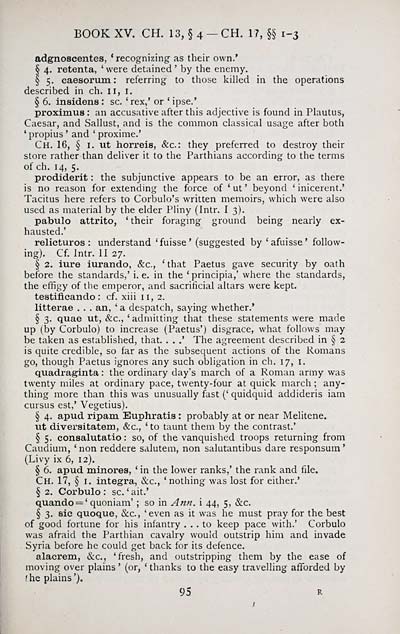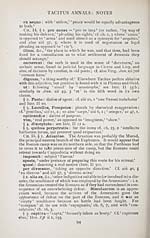Download files
Complete book:
Individual page:
Thumbnail gallery: Grid view | List view

BOOK XV. CH. 13, § 4 — CH. 17, §§ 1-3
adgnoscentes, 'recognizing as their own.'
§ 4. retenta, ' were detained ' by the enemy,
§ 5. caesorum: referring to those killed in the operations
described in ch. il, i.
§ 6. insidens : sc. 'rex,' or ' ipse.'
proximus: an accusative after this adjective is found in Plautus,
Caesar, and Sallust, and is the common classical usage after both
' propius ' and ' proxime.'
Ch. 16, § I. ut horreis, &c.: they preferred to destroy their
store rather than deliver it to the Parthians according to the terms
of ch. 14, 5.
prodiderit : the subjunctive appears to be an error, as there
is no reason for extending the force of ' ut ' beyond ' inicerent.'
Tacitus here refers to Corbulo's written memoirs, which were also
used as material by the elder Pliny (Intr. I 3).
pabulo attrito, 'their foraging ground being nearly ex-
hausted.'
relicturos : understand ' fuisse ' (suggested by ' afuisse ' follow-
ing). Cf. Intr. II 27.
§ 2. iure iurando, &c., 'that Paetus gave security by oath
before the standards,' i.e. in the 'principia,' where the standards,
the effigy of the emperor, and sacrificial altars were kept.
testiflcando: cf. xiii 11, 2.
litterae . . . an, ' a despatch, saying whether.'
§ 3. quae ut, &c., ' admitting that these statements were made
up (by Corbulo) to increase (Paetus') disgrace, what follows may
be taken as established, that. . . .' The agreement described in § 2
is quite credible, so far as the subsequent actions of the Romans
go, though Paetus ignores any such obligation in ch. 17, i.
quadraginta : the ordinary day's march of a Roman army was
twenty miles at ordinary pace, twenty-four at quick march ; any-
thing more than this was unusually fast (' quidquid addideris iam
cursus est,' Vegetius).
§ 4. apud ripam Euphratis : probably at or near Melitene.
ut diveraitatem, &c., ' to taunt them by the contrast.'
§ 5. consalutatio : so, of the vanquished troops returning from
Caudium, 'non reddere salutem, non salutantibus dare responsum'
(Livy ix 6, 12).
§ 6. apud minores, ' in the lower ranks,' the rank and file.
Ch. 17, § I. Integra, &.C., 'nothing was lost for either.'
§ 2. Corbulo : sc. ' ait.'
quando = ' quoniam' ; so in A fin. i 44, 5, &c.
§ 3. sic quoque, &c., 'even as it was he must pray for the best
of good fortune for his infantry ... to keep pace with.' Corbulo
was afraid the Parthian cavalry would outstrip him and invade
Syria before he could get back for its defence.
alacrem, &;c., 'fresh, and outstripping them by the ease of
moving over plains ' (or, ' thanks to the easy travelling afforded by
(he plains').
95 R
adgnoscentes, 'recognizing as their own.'
§ 4. retenta, ' were detained ' by the enemy,
§ 5. caesorum: referring to those killed in the operations
described in ch. il, i.
§ 6. insidens : sc. 'rex,' or ' ipse.'
proximus: an accusative after this adjective is found in Plautus,
Caesar, and Sallust, and is the common classical usage after both
' propius ' and ' proxime.'
Ch. 16, § I. ut horreis, &c.: they preferred to destroy their
store rather than deliver it to the Parthians according to the terms
of ch. 14, 5.
prodiderit : the subjunctive appears to be an error, as there
is no reason for extending the force of ' ut ' beyond ' inicerent.'
Tacitus here refers to Corbulo's written memoirs, which were also
used as material by the elder Pliny (Intr. I 3).
pabulo attrito, 'their foraging ground being nearly ex-
hausted.'
relicturos : understand ' fuisse ' (suggested by ' afuisse ' follow-
ing). Cf. Intr. II 27.
§ 2. iure iurando, &c., 'that Paetus gave security by oath
before the standards,' i.e. in the 'principia,' where the standards,
the effigy of the emperor, and sacrificial altars were kept.
testiflcando: cf. xiii 11, 2.
litterae . . . an, ' a despatch, saying whether.'
§ 3. quae ut, &c., ' admitting that these statements were made
up (by Corbulo) to increase (Paetus') disgrace, what follows may
be taken as established, that. . . .' The agreement described in § 2
is quite credible, so far as the subsequent actions of the Romans
go, though Paetus ignores any such obligation in ch. 17, i.
quadraginta : the ordinary day's march of a Roman army was
twenty miles at ordinary pace, twenty-four at quick march ; any-
thing more than this was unusually fast (' quidquid addideris iam
cursus est,' Vegetius).
§ 4. apud ripam Euphratis : probably at or near Melitene.
ut diveraitatem, &c., ' to taunt them by the contrast.'
§ 5. consalutatio : so, of the vanquished troops returning from
Caudium, 'non reddere salutem, non salutantibus dare responsum'
(Livy ix 6, 12).
§ 6. apud minores, ' in the lower ranks,' the rank and file.
Ch. 17, § I. Integra, &.C., 'nothing was lost for either.'
§ 2. Corbulo : sc. ' ait.'
quando = ' quoniam' ; so in A fin. i 44, 5, &c.
§ 3. sic quoque, &c., 'even as it was he must pray for the best
of good fortune for his infantry ... to keep pace with.' Corbulo
was afraid the Parthian cavalry would outstrip him and invade
Syria before he could get back for its defence.
alacrem, &;c., 'fresh, and outstripping them by the ease of
moving over plains ' (or, ' thanks to the easy travelling afforded by
(he plains').
95 R
Set display mode to: Large image | Transcription
Images and transcriptions on this page, including medium image downloads, may be used under the Creative Commons Attribution 4.0 International Licence unless otherwise stated. ![]()
| Early Gaelic Book Collections > Matheson Collection > Cornelli Taciti annalium > (261) |
|---|
| Permanent URL | https://digital.nls.uk/76569826 |
|---|
| Description | Items from a collection of 170 volumes relating to Gaelic matters. Mainly philological works in the Celtic and some non-Celtic languages. Some books extensively annotated by Angus Matheson, the first Professor of Celtic at Glasgow University. |
|---|
| Description | Selected items from five 'Special and Named Printed Collections'. Includes books in Gaelic and other Celtic languages, works about the Gaels, their languages, literature, culture and history. |
|---|

